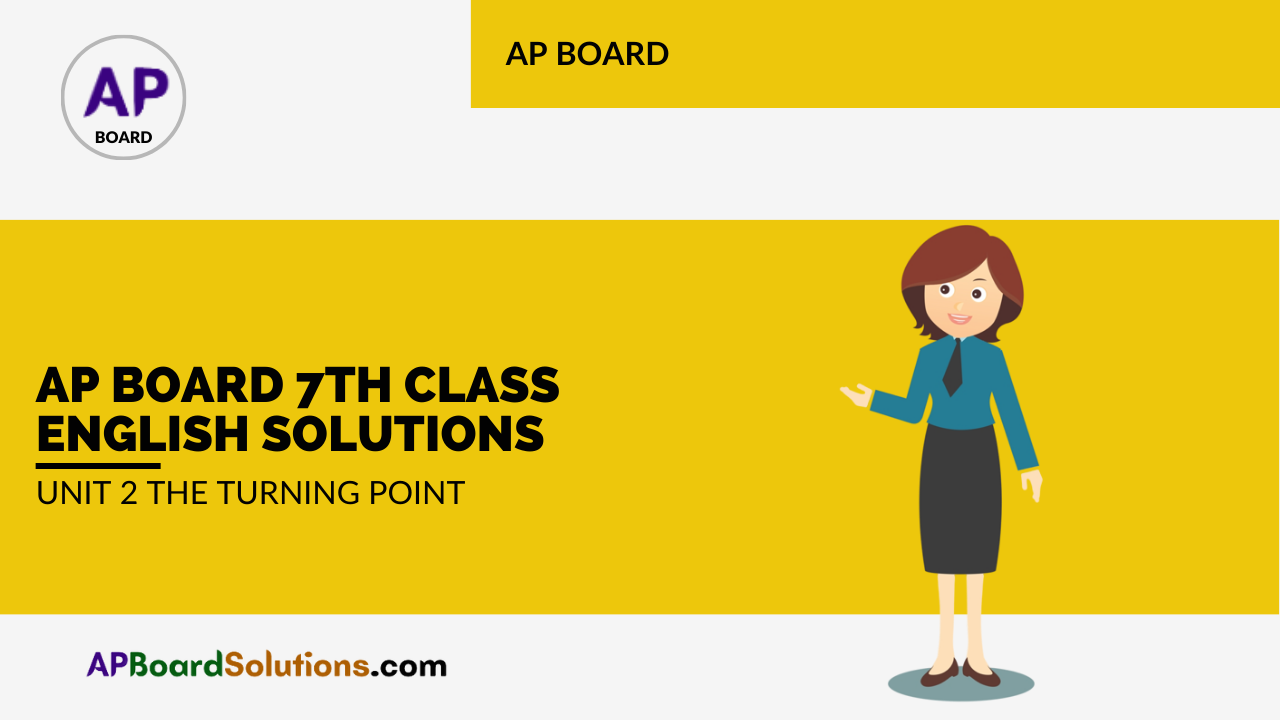SCERT AP 7th Class English Textbook Answers 2nd Lesson The Turning Point Textbook Questions and Answers.
AP State Syllabus 7th Class English Unit 2 Questions and Answers The Turning Point
7th Class English Unit 2 The Turning Point Textbook Questions and Answers
Observe the following picture and respond.
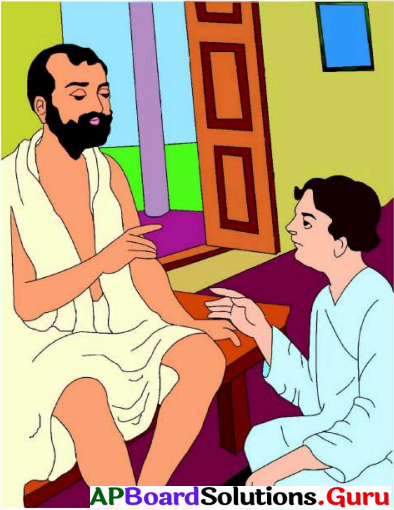
Question 1.
Guess the characters in the picture.
Answer:
The characters in the picture are a wise man and common man.
Question 2.
How do you think are they related to each other?
Answer:
The man with beard was a guru and the other man was a disciple.
Question 3.
Why did the young man meet the other person?
Answer:
The young man met the other person to take his advice.
Question 4.
What is the man with a beard saying?
Answer:
The man with a beard is saying something good.
![]()
Question 5.
Why do we listen to persons?
Answer:
We listen to persons to get good advice out of their experience.
Questions Given in the Lesson
Possible answers to the questions given in the middle of the lesson :
Question 1.
Who is your favourite teacher? What do you like about him/her? Which topic fascinated you the most in his/her class?
Answer:
Our science teacher is my favourite teacher.! like her way of explaining things and her way of treating the children. Almost all the topics taught by her fascinate me the most.
Question 2.
What do you want to become in your life?
Answer:
I want to become a doctor/an engineer/a teacher in my life.
Question 3.
How do you feel when you see birds flying in groups?
Answer:
It is really a wonderful sight to see. I feel thrilled at the sight of the birds’ flight in groups.
Reading Comprehension
A. Answer the following questions.
Question 1.
Why did Kalam take up the job as a newspaper boy?
Answer:
At the time of the Second World War, all the resources were scarce and the prices were not affordable. So, Kalam took up the job as a newspaper boy.
Question 2.
What was Kalam curious about?
Answer:
Kalam was curious about planes. He wanted to be a pilot himself.
Question 3.
Which topic did Shri Siva Subrahmania Iyer discuss one day in the class?
Answer:
The topic that Shri Siva Subrahmania Iyer discussed one day in the class was ‘how birds fly’.
Question 4.
Where did the teacher take the whole class to explain the concept of bird’s flight?
Answer:
The teacher took the whole class to the seashore to explain the concept of bird’s flight.
Question 5.
What was the turning point in Kalam’s life? Explain.
Answer:
The Kalam teacher’s lesson on bird’s flight was the turning point in his life.
![]()
Question 6.
When was Kalam honoured with the Bharat Ratna?
Answer:
In 1997, Kalam was honoured with the highest civilian award the Bharat Ratna.
B. Arrange the following sentences in the order they occurred in the story.
1. Abdul Kalam decided to study aeronautical engineering.
2. The photos of fighter aircrafts and the stories of the Second World War caught my attention.
3. In 2002 he was elected the 11th President of India.
4. Siva Subrahmania Iyer took the whole class to the seashore.
5. Kalam felt what he had learnt that day changed his life.
Answer:
2. The photos of fighter air crafts and the stories of the Second World War caught my attention.
4. Siva Subrahmania Iyer took the whole class to the seashore.
5. Kalam felt what he had learnt that day changed his life.
1. Abdul Kalam decided to study aeronautical engineering.
3. In 2002 he was elected the 11th President of India.
C. Read the following statements. Answer ‘True’ (T) or ‘False’ (F).
1. Sri Siva Subramania Iyer, sowed the seeds of vision.
2. One day Kalam taught about the bird’s flight.
3. Sri Subramania Iyer took the students to the airport to show the flying of aeroplanes.
4. Sri Kalam took up computer engineering at Madras institute of Technology
5. Sri Subramania Iyer ignited young minds.
Answer:
- True
False - False
- False
- True
Correct the false statements and rewrite them in the space provided.
Answer:
2. One day Kalam was taught about the bird’s flight.
3. Sri Subramania Iyer took the students to the seashore to show the flying of birds.
4. Sri Kalam took up aeronautical engineering at IIT, Madras.
Vocabulary
A. Other forms of the words
Read the following sentences from the text.
1. The prices were not affordable.
2. It was usually filled with the photos of fighter aircrafts.
Look at the underlined words in the above sentences. The word ‘affordable’ comes from the root word ‘afford’ and the word ‘usually’ comes from the root word ‘usual.’
Identify’ the other forms of the following words used in the lesson ‘The Turning Point’.
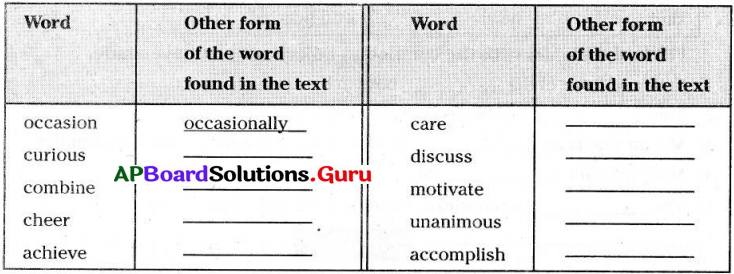
Answer:
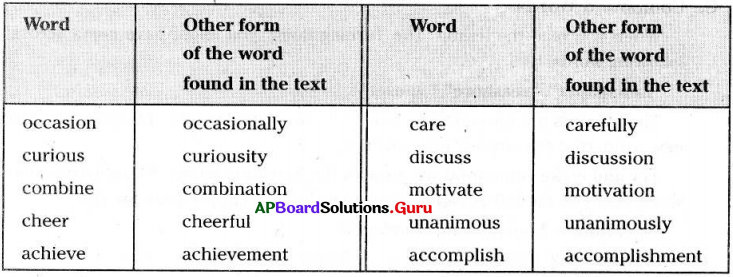
B. Compound Adjectives
Read the following sentences.
My curiosity was fulfilled by a very special teacher when I was a ten-year-old boy in Class V. This was indeed a life-changing event.
In the above sentence the words “ten”, “year” and “old” and “life” and “ changing” are combined using a hyphen (-) and is made into a single adjective called compound adjective. Compound adjectives can be formed by bringing two different words to¬gether with a hyphen.
E.g. five-day, smart-looking, old-fashioned, short-haired
Match the following words in Set -A with Set – B to make coi lpound adjectives and write them in the space given.
| Set-A | Set-B | Compound Adjective |
| absent | aged | absent-minded |
| middle | hearted | middle-aged |
| well | behaved | well-behaved |
| brand | minded | brand-new |
| kind | new | kind-hearted |
Fill in the blanks with the compound adjectives you have made.
1. Kalarn was one of the ………….. boys in his class.
2. The ………… girl helped the old man to cross the road.
3. Mohan who is an ………… person, forgot his wallet at the cash counter.
4. Murali bought a …………. car.
5. The ………… man who is standing at the gate, is my uncle.
Answer:
- well-behaved
- kind-hearted
- absent-minded
- brand-new
- middle-aged
C. Compound Words
When you read the lesson ‘The Turning Point’ you might have come across the following words.
“newspaper”, “seashore”,” sunset”
These words are formed when two or more words are joined together to create a new word, that has entirely new meaning.
Try and make compound words with the following words. You are free to add a word either to the left or right of the given words. One is done for you.
E.g.: House – housekeeper, storehouse
1. Hand 2. Room 3. Pot 4. Butter 5. Box
Answer:
1) hand : handmade, firsthand, handshake, handprint, handicraft
2) room : roommate, classroom, bedroom .
3) pot : pothole, teapot, inkpot, pothead, potluck
4) butter : buttermilk, butterfish, peanut butter
5) box : gearbox, toolbox, mailbox
Make more compound words and have fun.
![]()
Compound Words:
bedroom, airport, anybody, backbone, background, cardboard, commonwealth, daybreak, earthquake, fireproof, grandchildren, headache, inside, jackpot, keyboard, layout, moonlight, newsreader, overcoat, passbook, playground, scarecrow, talebearer, understimate, warehouse, etc.
Fill in the blanks with a suitable word from the help box to make a compound word. One is done for you.
E.g. moon light house
(Moonlight and lighthouse are two different compound words with the same word ‘light’.)
Help Box
light
cover
sugar
fisher
land
paper
1. Cane sugar candy
2. News paper bag
3. Pillow cover story
4. King fisher man
5. Grass land mark
Answer:
1) canesugar, sugarcandy
2) newspaper, paperbag
3) pillowcover, coverstory
4) kingfisher, fisherman
5) grassland, landmark
Grammar
The Present Perfect Tense vs The Simple Past Tense :
Look at the following sentences from the text.
1) That evening he took all of us to the seashore.
2) I chose physics.
3) This was indeed a life-changing event.
4) Kalam dedicated his achievements to all his teachers.
The above sentences denote the actions completed in the past. Hence, the verb is in simple past tense.

Identify at least five verb forms used in the simple past tense from the text.
Answer:
- caught (Irregular Verb)
- manoevured (Regular Verb)
- belonged (Regular Verb)
- grew (Irregular Verb)
- drew (Irregular Verb) 6. explained (Regular Verb)
- understood (Irregular Verb)
- asked (Regular Verb)
- needed (Regular Verb) 10. opted (Regular Verb)
Exercise – 1
Fill in the blanks with past form of the verb given in brackets.
1. Sankar …………… (join) the bank last month.
2. Where …………… (be) you yesterday?
3. Fathima …………… (pass) the intermediate exam in 2016.
4. Indian Cricket team …………… (win) the trophy in 2017.
5. Leena …………… (write) her examinations and …………… (go) home immediately.
Answer:
- joined
- were
- passed
- won
- wrote, went
Already we have discussed ‘present perfect tense’ in unit-1.
Present perfect tense denotes the action that began in the past and continuous to the present time.
We write present perfect tense with the markers like ‘just, yet, etc. (adverbs of time).
We write past tense with the markers like yesterday, last week/month/…, ago, etc.
![]()
Exercise – 2
Adverbs of time used with present perfect tense
![]()
Fill in the blanks with Adverbs of Time :
1. Is Mr. Ravi at home?
No, he …………… left for work.
2. When does the train to Kakinada arrive?
It has …………… left.
3. The Chief Guest hasn’t arrived …………… .
4. I have lived in Vijayawada …………… a long time.
5. I have lived in Delhi …………… 2004.
6. Have you been to a circus?
Answer:
1. Is Mr. Ravi at home?
No, he already left for work.
2. When does the train to Kakinada arrive?
It has just left.
3. The Chief Guest hasn’t arrived yet.
4. I have lived in Vijayawada for a long time.
5. I have lived in Delhi since 2004.
6. Have you ever been to a circus?
Writing
A. You have read the text ‘The Turning Point’. The stories of the World War and the inspiring teachings of his teacher Sri Siva Subramania Iyer acted as a turning point of Kalam’s life.
Now prepare a script for a speech on the turning point in the life of Abdul Kalam and present it on the Teachers’ Day in your school.
Answer:
Respected Headmaster, teachers and other staff, Happy Teachers’ Day to all of you. It is a great privilege for me to be here to speak about the turning point in Kalam’s life.
A.P.J. Abdul Kalam always used to say he would like to be remembered as a teacher. When he became the President in 2002, he made no compromise on his passion for teaching. He grabbed every opportunity to teach students, especially children, wherever he went.
His curiosity grew in science because of a very special teacher, when he was a ten- year-old boy in Class V. This was indeed a life-changing event. His science teacher’s name was Shri Siva Subramania Iyer. One day the topic of discussion in his class of sixty-five was ‘how birds fly’. He drew a sketch of a bird with a tail, wings and feathers a head on the board and explained how a bird flew.
That evening he took all of them to the seashore. He asked all of them to notice how the birds make a formation in a group and fly. Mr. Iyer also made them notice how the bird is powered to fly by itself.
The flight principle got imprinted in Kalam’s mind and he decided that in the future he would study subjects related to flight. However, as a little boy he needed guidance to pursue that field. The teacher told Kalam to study and explore the field of aviation .science and aeroplanes.
Whatever he had learnt that day changed his life. He was inspired to have an aim. Later he realized how important it was to study physics. He chose physics. He opted for aeronautical engineering at the Indian Institute of Technology, Madras. Then, he became an aeronautical engineer and a space technologist. Mr. Iyer’s class had transformed his life which led him to make a profession out of his passion and his career began in that field.
We have to take Kalam’s life as an inspiration to grow high in our lives.
Thank you very much for giving me this opportunity.
B. Prepare a biographical sketch of Sri APJ Abdul Kalam using the given information.
Birth : 15 Oct 1931 at Dhariushkodi, Rameswaram, Tamil Nadu.
First job : Newspaper vendor
Inspiration : His Science teacher Sri Siva Subramania Iyer’s lecture
Education : Aeronautical Engineering from IIT(M) ( 1960)
Positions : IGMDP, DRDO, ISRO – Chief Advisor and Chairman
Achievements : Project Devil and Project Valiant (1970)
SLV – III, ROHINI, PSLV, PRUTHVI & AGNI Missiles, Nuclear Test. -Pokhran -II
Invented ‘Low Cost Coronary Stent’ and Rugged Tablet Computer with Dr. Soma Raju (1998)
Unanimously elected as the President of India (2002 – 2007) ‘People’s President.
Literary Works : Wrote ‘Wings of Fire’, ‘Ignited Minds,’ etc.
Awards : Honoured with Padma Bhushan (1981), Padma Vibhushan (1990) and Bharath Ratna(1997)
Death : 27 July 2015
Answer:
A.P.J. Abdul Kalam was born on 15th October 1931 at Dhanushkodi, Rameswaram, Tamil Nadu. In his childhood he worked as a newspaper vendor. His Science teacher Shri Siva Subrahmania Iyer’s lecture inspired him a lot. He completed Aeronautical Engineering from IIT(M) ( 1960) He held the position of the Chief Advisor and Chair¬man ot IGMDPV DRDO, ISRO. He was responsible for Project Devil and Project Valiant (1970), SLV – III, ROHINI, PSLV, PRUDVI & AGNI Missiles, Nuclear Test at Pokhran -II. He invented ‘Low Cost Coronary Stent’ and Rugged Tablet Computer with Dr. Soma Raju (1998). He was unanimously elected the presedent of India (2002 – 2007) . He was known as ‘People’s President. He wrote ‘Wings of Fire’ and ‘Ignited Minds. He was honoured with the Padma Bhushan (1981), the Padma Vibhushan (1990) and the Bharath Ratna (1997). He passed away on 27 July 2015.
![]()
Fun Time
Try the following riddle.
The three-letter word that reads the same backwards : eye (a part of the body)
Read the following ‘Palindrome’.
- Race car
- Madam
- Don’t nod
- Dogma I am God
- Never odd or even
- Madam I’m Adam
- Too bad I hid a boot
Talking Time
A. Making Announcements:
Read the announcements usually made during the school assembly.
Dear Students, I have an announcement to make. We are planning to conduct sports and literary competitions on the occasion of Independence Day. The students those who want to participate in the sports competitions have to give their names to the Physical Director of our school. Those who want to participate in the literary competitions have to give their names to the English teacher.
You are the secretary of your school English Club. Make an announcement for the activities to be planned for the English Day.
Answer:
Dear Students, I have an announcement to make. We are planning to conduct a quiz and literary competitions on the occasion of the English Day. The students those who want to participate in the quiz competition have to give their names to Biology teacher of our school. Those who want to participate in the literary competitions have to give their names to the English teacher.
![]()
B. Role-play:
Polite Request : (Could you please / Would you mind)
Srikar : Excuse me, could you please tell me when the Tirumala Express leaves for Vizag?
Enquiry : It starts at 5.05 p.m. every day.
Srikar : Could you please tell me the time of arrival at Vizag ?.
Enquiry : It reaches Vizag at 11 a.m. the next day.
Srikar : Thank you. Would you mind telling me if the tickets are available for tomorrow?
Enquiry : Let me check. Sorry. No tickets are available until next Sunday.
Srikar : OK, thank you, Sir. I’ll plan my journey accordingly.
Enquiry : You are welcome.
Language focus
1. Could you please ………………………
Eg : Could you please give me your pen?
2. Would you mind ……………………..
Eg : Would you mind opening the window? / Could you open the window?
Exercise – A
Underline the correct expression to complete each request.
1. Could you / Would you mind bringing me some milk for my coffee?
2. Could you / Would you mind answering the question?
3. Could you / Would you go to the shop for me?
4. Could you / Would you mind turning off the music?
5. Could you / Would you mind bringing me a glass of banana juice?
Answer:
- Could you / Would you mind bringing me some milk for my coffee?
- Could you / Would you mind answering the question?
- Could you / Would you go to the shop for me?
- Could you / Would you mind turning off the music?
- Could you / Would you mind bringing me a glass of banana juice?
Exercise – B
Complete the polite requests with the correct forms of the verb in brackets.
1. Could you …………… (bring) me a cup of coffee?
2. Could you …………… (lend) me your pen?
3. Would you mind …………… (call) a taxi for me?
4. Would you mind …………… (close) the door?
5. Could you …………… (get) me a glass of water?
6. Would you mind …………… (carry) these bags for me?
Answers
- bring
- lend
- calling
- closing
- get
- carrying
Listening
Transformation of Vivekananda
The relationship between Sri Ramakrishna and Vivekananda (formerly named as Narendranath) began in November 1881 when they met at the house of Surendranath Mitra. Ramakrishna had asked Narendranath to sing. He was impressed with the sing¬ing talent of Narendranath and invited him to Dakshineswar.
Narendra accepted the invitation. The meeting with Sri Ramakrishna proved to be a turning point in the life of Narendranath. Initially, he did not accept Ramakrishna as his master. But eventually, he became one of the closest disciples of-Ramakrishna who shaped the personality of Narendranath and inspired him to dedicate his life to serve the human.
Inspired by Ramakrishna, Narendranath became a monk and was named Vivekananda and he presented a speech at the Parliament of the World’s Religions held on 23rd September, 1893 in Chicago.
His meeting with Sri Ramakrishna in Dakshineswar was a turning point which re-sulted in the transformation of Vivekananda.
A. Listen to the story and state the following statements are true / false.
1. The meeting with Sri Ramakrishna was the turning point in the life of Vivekananda.
2. Sri Ramakrishna presented a speech in Chicago.
3. Sri Ramakrishna and Vivekananda first met at the house of Surendranath Mitra.
Answer:
- True
- False
- True
Comprehension
1. Why did Ramakrishna invite Narendranath to Dakshineswar?
Answer:
Sri Rafnakrishna was impressed with the singing talent of Narendranath and he invited him to Daksineswar.
2. How did Ramakrishna inspire Narendranath?
Answer:
Ramakrishna inspired Narendranath by his wisdom.
3. Where did Vivekananda present his speech?
Answer:
Vivekananda presented his speech in Chicago.
4. What did Vivekananda dedicate his life to?
Answer:
Vivekananda dedicated his life to serve the human.
5. Do you believe in transformation of yourself?
Answer:
Yes.
Study Skill
Study the following Tree diagram.
Answer the following questions :
1. What is the tree diagram about?
Answer:
The tree diagram is about the things in our sufroundings.
2. What are the two kinds of animals mentioned in the above tree diagram?
Answer:
Living things and Non-living things.
3. Things in our surroundings are categorised into _________ .
a) 3
b) 2
c) 4
Answer:
b) 2
4. ‘Viviparous’ is a category of _________ .
a) Plants
b) Oviparous
c) Animals
Answer:
c) Animals
![]()
5. ‘Plants and animals’ come under _________ .
a) Living things
b) Oviparous
c) Non-living things
Answer:
a) Living things
The Turning Point Summary
The Turning Point’, is an edited extract from ‘My Teachers’ by DR A.P.J. ABDUL KALAM. The turning point means- An important change in the life of a person. This is the true story of Abdul Kalam that made a turning point in his life. When he was in class V, one day his teacher Shri Siva Subramania Iyer taught him about a bird’s flight in the class. When the teacher explained in the class about a bird’s flight most of the students including Kalam had not understood the lesson. So the teacher took them all to the seashore of Rameswaram (birthplace of Kalam) to teach them practically. The teacher showed there how a bird flies. He asked the students to look at the tail and the combination of flapping wings and twisting tail. The teacher explained how the birds changed direction, and position could fly in the direction they wanted to. After that all the students understood the lesson of a bird’s flight. For Kalam the lesson was not merely an understanding of how a bird flies. He decided that he wanted to study all he could about the concept of flight. So he took his teacher’s advice about the further study of Science. He became a rocket engineer, an aerospace engineer and a technolo¬gist. But the memory of his teacher encouraging him to become a successful person was up to the end of Kalam’s life.
The Turning About the Author
Avul Pakir Jainulabdeen Abdul Kalam was an Indian aerospace scientist and a politician who had served as the 11th President of India from 2002 to 2007. He was born on the 15th of October, 1931 at Dhanushkodi, Rameswaram, Tamil Nadu. He is popularly known as the Missile Man of India. His book Wings of Fire’ is widely read and is inspiring. This lesson is an extract from his book My Teachers’.
Meanings For Difficult Words
turning point (n) : a time at which an important change takes place
conflict (n) : clash, a serious disagreement
scarce (adj) : rare
affordable (adj) : reasonably priced
defend (v) : protect
manoeuvred (v) : plotted / steered / moved skillfully
curiosity (n) : a strong desire to know
gloomy (adj) : unhappy
flap (v) : move up and down
generate (v) : produce or create
unique (adj) : matchless/special
transform (v) : change
passion (n) : strong desire
indigenous (adj) : native, local
ignite (v) : light, kindle
Give Me Strength Poem
This is my prayer to thee, My Lord – strike,
strike at the root of penury in my heart.
Give me the strength lightly to bear my joys and sorrows.
Give me the strength to make my love fruitful in service.
Give me the strength never to disown the poor or bend my knees before insolent might.
Give me the strength to raise my mind high above daily trifles.
And give me the strength to surrender my strength to thy will with love.
Rabindranath Tagore
Appreciation of The Poem
A. Answer the following questions :
Question 1.
What does the poet pray for?
Answer:
The poet prays to God for giving him strength.
Question 2.
What does the poet want to bear with strength?
Answer:
The poet wants to bear joys and sorrows with strength.
Question 3.
Wteafcitype of service does the poet want to make?
Answer:
He wants to be in the service of humankind with sincerity and humility.
![]()
Question 4.
How does the poet want to treat the poor and the mighty?
Answer:
He wants to help the poor and never to bend before rude and disrespectful authority.
Question 5.
What does the poet want to do with the strength finally?
Answer:
He wants to raise his head above petty and ordinary things and surrender his strength before the will of God.
Additional Questions
Question 1.
Why does the poet want God to strike at his heart?
Answer:
The poet implores God to strike at his heart to remove the hardheartedness and remake it with love and compassion. He wants to be a loving and caring human beings.
Question 2.
What does the poet want the strength for?
Answer:
The poet wants strength to bear joys and sorrows. He wants strength to make his love fruitful in service. He needs strength never to disown the poor or bow before a tyrant. Moreover, the poet needs strength to avoid the daily trifles and submit his will to the will of God.
Question 3.
How can love be made meaningful in one’s life?
Answer:
Love is meaningful when it bears fruits of service, service of mankind.
Question 4.
What should be our attitude towards the poor?
Answer:
Our attitude towards the poor should be very sympathetic. We should never disown or neglect them. We should always help the poor and work for their welfare.
Question 5.
What does “bend my knees” signify?
Answer:
The bending of one’s knees means to surrender before a powerful person. Here, the poet prays to God to give him the strength to resist and not to bend the knees before a tyrant.
Question 6.
Why does the poet want to raise his mind high above “daily trifles”?
Answer:
The poet wants to raise his mind high above the daily trifles so that he would not be involved in the issues that fill his heart with malice and prejudice.
Question 7.
Why does the poet ask for strength to surrender his will to God’s will?
Answer:
The poet wants to surrender his will to the will of God in order to live a pure and obedient life. As it is not easy to submit one’s will, the poet prays for the strength to do so.
B. Choose the right option and write it in the brackets given.
1. Strike at the root of _____ in my heart.
a) treasury
b) happiness
c) penury
Answer:
c) penury
2. Give me strength to bear my _____
a) riches and treasures
b) joys and sorrows
c) property
Answer:
b) joys and sorrows
3. Give me strength to make my love _____ in service.
a) fruitful
b) selfish
c) sacrifice
Answer:
a) fruitful
![]()
4. Give me strength to raise high above daily _____
a) enjoyment
b) trifles
c) chores
Answer:
b) trifles
5. The poet wants to surrender his strength to _____
a) the mighty
b) God’s will
c) the poor
Answer:
b) God’s will
Check Point
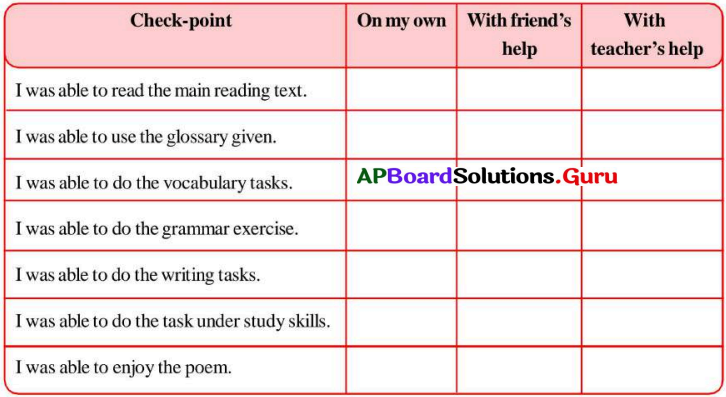
Give Me Strength Summary
“Give Me Strength” is an inspirational poem by the versatile Rabindranath Tagore. The poem is in a form of a prayer and the poet is asking the Lord to provide him with strength so that he can overcome all the hurdles in life.
This poem “Give Me Strength” is short but beautiful poem written by Rabindranath Tagore. In this poem, the poet prays to God to strike at the core of his heart and remove the ignorance from there. He prays to God to give him strength so that he bears the joys and sorrows of life in the same spirit. It means that the poet wants to be stoic in his nature. He wants to be in the service of humankind with sincerity and humility. He wants to help the poor and never to bend before rude and disrespectful authority. He also prays for strength to raise his head above petty and ordinary things and surrender his strength before the will of God.
Give Me Strength About the Poet
Rabindranath Tagore (7 May 1861 – 7 August 1941) usually called Gurudev was a learned man from West Bengal from the Indian sub continent. He was a poet, musician and artist. He reshaped Bengali literature and music. He is the author of the Gitanjali, which is a collection of beautiful verse. He was the first Indian to win the Nobel Prize in literature in 1913. Tagore’s poetry is viewed as spiritual and patriotic. He was referred to as ‘the Bard of Bengal’.
Meanings for Difficult Words
Thee (n) : you
strike (v) : hit forcibly
penury (n) : extreme poverty; (here) hardheartedness, lacking love and compassion
fruitful (adj) : bearing abundant fruit; producing results
disown (v) : not own / refuse
insolent (adj) : disrespectful, rude
might (n) : power / impressive power.
trifles (n) : things of little value or significance
surrender (v) : yield; give up.
thy (pron.) : your (old use)
